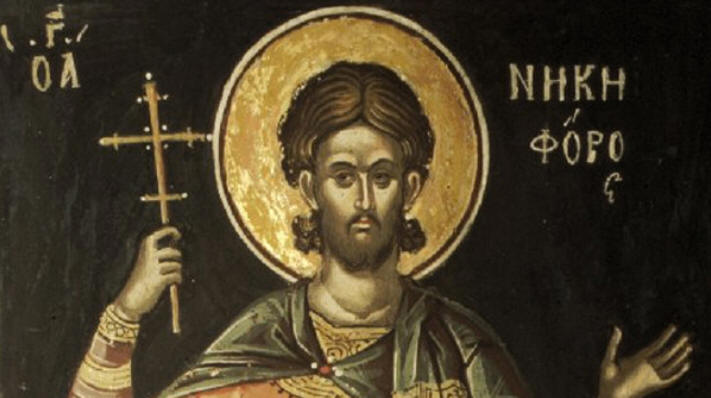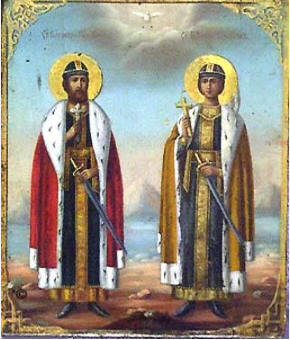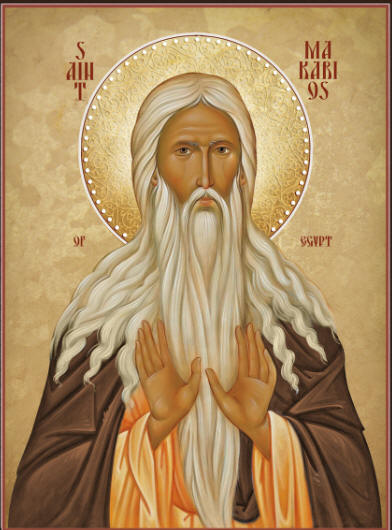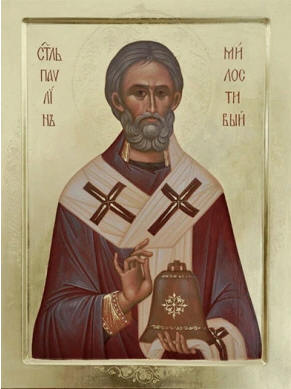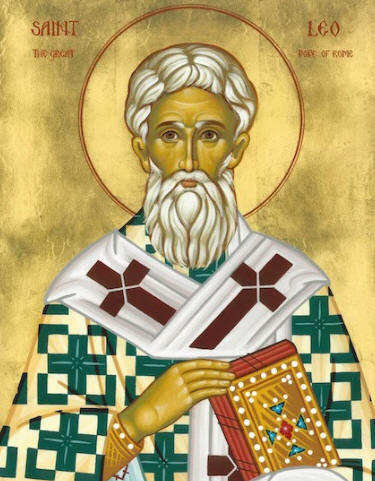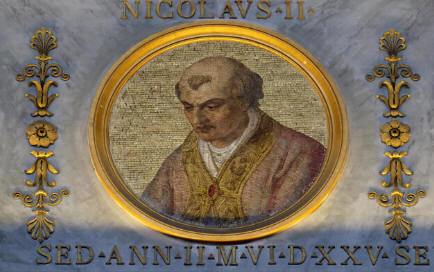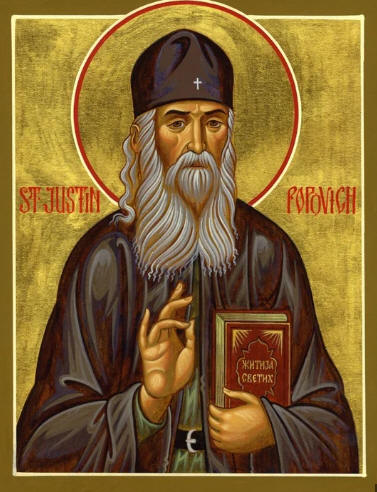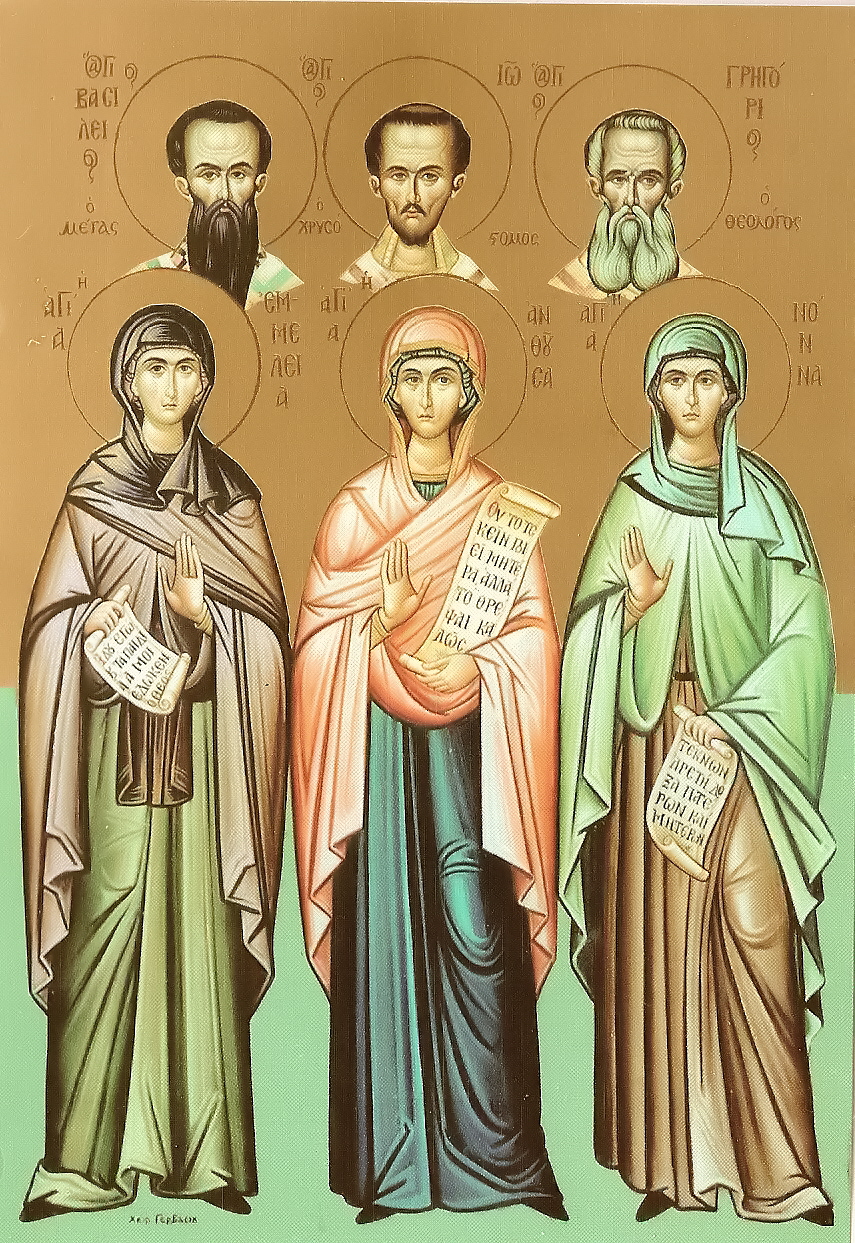| Orthodox Outlet for Dogmatic Enquiries | Orthodoxy |
“Education Day”
-
in a world lacking education
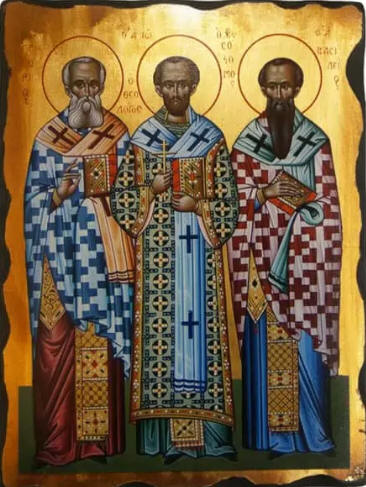
A commentary by Theodore Riginiotes, educator, theologian
|
The Orthodox Feast of the Three Hierarchs (January 30) – the
traditional celebration of Education –
is
now in a world deprived of
genuine
Education.
Normally
a
Celebration
of Caring,
it
is now
in a conquered and ruined world searching
for love and caring...
One could say that the
pillars of Greek civilization
are
three: ancient Greece, the Greek Fathers of the Church and the
younger, contemporary Greek writers and thinkers.
From these three spiritual spheres,
people
can draw supplies
designed
for a life of freedom and
of
quality - and it is imperative that
it
urgently does
so
in our time,
because, as the years pass, the mighty of the world deprive us of
our freedom and degrade the quality of our lives.
Of ancient Greece, we can learn something in school. Of the younger,
contemporary Greek spiritual creations,
likewise
something.
Unfortunately, today’s schools are like besieged castles, undergoing
attacks from all directions, with the result that students cannot
see
the true value of education,
and
so are not reaching out
to benefit from the gifts that education can offer, in spite of the
adversities.
Anyway,the
sphere about which almost nothing
is taught,
is
of
the Fathers of the Church (that is, the holy teachers of
Christianity), given that the minimal references
that
do
exist
are limited to the
vague
lesson of “Religious Studies” - when they
also
deserve
a
place in the lessons of Philology and Sociology. They are now
regarded only as mere religious thinkers, when they were igniters of
souls, studiers of the deeper motives of human behavior, studiers of
social phenomena, as well as teachers of peaceful revolutions.
If only we
learnt more
about them
-
and even more, if we
bothered
to
study
their written works and their personal example
-
our life and society would have been completely different. Man
himself, as an entity, would have been quite different, as he was
seen as a king, crowned
with light, in the kingdom of heaven, and not a beggar at the mercy
of an oppressive God, nor an instrument in the hands of wealthy and
power-wielding
governors.
The Fathers of the Church themselves had
stood up to
the authorities
of their time –
resistance
without bearing arms,
even
to the death. Some of them were philosophers, such as Saint Maximus
the Confessor and Saint John Climacus. Some were educators and
organizers of large-scale humanitarian activities - such as the
Three Hierarchs. Some were poets and musicians, who bequeathed
masterpieces of incomparable artistic value and philosophical depth,
such as Saint John of Damascus, Saint Romanos the Melodious, Saint
Cosmas the Melodious, Saint Cassiane the Hymnographer... and many
others, whose works are chanted even today in church, exactly as
they had been written.
Others, finally, were men and women hermits, who broke every
stereotype, lived a life of self-denial and love, and taught people
the wisdom and self-awareness that they had
attained
through their
personal
struggles.
Among them are not only Greeks, but also Egyptians (such as Anthony
the Great, Saint Macarius the Egyptian, Saint Mary the Egyptian);
Sudanese, Ethiopians, Syrians (such as Saint Isaac the Syrian and
Saint Ephraim the Syrian, who are commemorated on January 28),
Persians
(Saint Anastasius the Persian)...
but also Italians, French, British, Spanish
- mostly,
from
olden
times, when the entirety of Europe observed a uniform
Christianity...
Saint
Genevieve of Paris, Saint
Martin of Tours, Saint
Gregory of Rome, Saint
Patrick of Ireland, Saint
David of Wales, and countless others (to them were
also
Russians and others,
from all the Balkan countries),
all
compose a pan-European mosaic, a truly United Europe, which is not
based on the economic interests of the few, but on love and
kindness, which - according to the Gospel - begins now and lasts
through to eternity. And it is noteworthy, that they had ruthless
emperors to contend with, barbarian raiders, gangs of fanatics,
impostors who deceived the masses with supposedly advanced spiritual
teachings, just like it is today.
Our age is disturbingly similar to the age of the ancient Fathers of
the Church, which is why it is of utmost urgency to discover what
they said and what they did, in every difficult situation.
There are countless episodes from the lives of the saints that are
worth narrating...
episodes about those who sacrificed their lives to save others – for
example, the Greek historian Eusebius mentions the epidemic of 251
AD, where the idolaters threw out their sick relatives,
for
fear of becoming contaminated, which however the Christians would
gather from the streets, care for them, and not
worrying
if they themselves became contaminated... Then there were others,
who distributed all their wealth to the poor - like Saint George,
Basil the Great, his sister Saint Macrina the Philosopher, Saint
Philaret the Merciful, Anthony the Great, St. Melanie of Rome, St.
Philothei of Athens, St. Elizabeth of Russia (the last two were also
martyred by people who did not understand the grandeur of their
love), e.a.
Also about physician saints, who treated the sick without “silver”
(=money), hence their Greek title of “Anargyroi” (meaning
silver-less, unmercenary).
Among them are four such holy physicians: Saint Hermione,
Xenaida, Philonilla and Sophia the Physician; but also a recent
example, the Eldress Gabriella, who traveled the world offering her
medical care gratis, to the most seriously suffering people).
Saints, who stood up against the authority of their time, as had all
the Martyrs, (including young girls), confronting merciless
emperors; such were Saint Ambrose of Milan, St. Germanus of
Constantinople, St. Martin of Rome, St. Theodore the Studite, St.
Philip of Moscow (the enemy of Tsar Ivan the Terrible, who had also
killed him)... Saints, who had clashed even with the ecclesiastical
establishment of their time – as was Saint John the Chrysostom (the
giant of philanthropy), Saint Maximus the Confessor, Saint Maximus
the Greek in Russia, St. Nilus of Sora and many others…
But only a few, particularly touching cases will be mentioned
below:.
• Saint Nikephoros
the Martyr.
During the era of persecutions, he surrendered himself to the Roman
legions, confessed that he is a Christian and was put to death, for
the sake of his friend, the priest Sapricius, who had denied Christ.
To save the Christ-denier in eternity, the saint sacrificed himself.
In fact he did this, even though Sapricius had ceased to regard him
as his friend and hated him, and all the efforts of Saint Nikephoros
for those sins to be forgiven had proven fruitless.
But we need to
be aware
that such people
also
exist in the Orthodox Church even today. Father Themistocles in
Sierra Leone, Eldress Nectaria in Calcutta, Father Jonah in Taiwan,
Father John Kibuka in Uganda and countless others, in Greece and
abroad (yes, in Greece also), are struggling against the worldly
powers, striving to put in practice the love of Christ.
The designation of “Three Hierarchs” prevailed when naming the three
important bishops of the 4th century AD, who lived in the Roman
Empire, when Christianity had only just begun to prevail. They are
Basil the Great, Gregory the Theologian and John the Chrysostom.
Basil and Gregory were brotherly friends and fellow students at the
Philosophical School of Athens. John the Chrysostom lived a
generation after the aforementioned two; that is, he was still young
when they had passed away and does not seem to have met them. All
three of these hierarchs were highly educated and their contribution
to literature and society was immense and multifaceted, which is why
they were considered three of the most important Church Fathers of
all time. Given that they had written a great deal about education,
their feast day was established in the modern Greek state as a
school holiday.
It was deemed appropriate to commemorate them this year, hence the
reason to say a few things about them, and also about several other
unknown, but important - important, but unknown - peaceful
revolutionaries and luminous victors.
Here’s hoping that more will
be said about the Three Hierarchs from now on.....
An additional piece of information is that Saint John the Chrysostom
is the author of the Divine Liturgy text, which is celebrated in
Orthodox Churches every Sunday throughout the year, except when the
liturgy of Basil the Great is performed. The two saints composed
the Liturgy
in such a way that two rivers flowed through it: the symbolic
repetition of the life of Christ (from His birth to the Crucifixion
and -according to Christians- His Resurrection and Ascension), and
the symbolism of the Second Coming, the general resurrection of the
deceased (that is, the victory over Death) and the Kingdom of
Heaven, which is destined for us all.
As Saint Chrysostom writes, this Liturgy is performed not only by
the priest, but
together with
all the laity, men and women, without discrimination and prejudice,
because we are all kings and priests, heirs and co-regents in the
Kingdom of God –
a fact that
is also emphasized in many places in the New Testament.
Therefore, on their commemorative feast day, and every Sunday, it is
beneficial for all to be in church, to partake of this ancient
Divine Liturgy, with the repetition of the Last Supper and the
foretaste of the kingdom of heaven.
The
Three Hierarchs will definitely be present. Christ and the Holy
Mother, Angels and Saints will also be present. There will also be
thousands of ordinary people present - orthodox Christians - who are
not
swayed
by “social media” and television spectacles and games, because they
have greater expectations in their lives and in the lives of their
children: the expectation of love and of eternity.
A final thought: There
are those grandparents, housewives, people perhaps of a moderate
education (among them maybe some who are very educated), who
“continue to resist and will always resist the conqueror”. They are
the true, everyday heroes, who deserve to be visited, to shake hands
with,
and exchange
warm reciprocating wishes.
In the words of the poet:
“When they shake hands, the sun is certain for the world”...
That
Ark
– of the
Divine
Liturgy – always sails towards heaven, and there are
always
places in it for each and every participant...
PS: The mothers of the Three Hierarchs, Saints Emmelia, Nonna and Anthousa, are also honored by the Orthodox Church; they are commemorated on the first Sunday of February.
Translation: A.N. |
